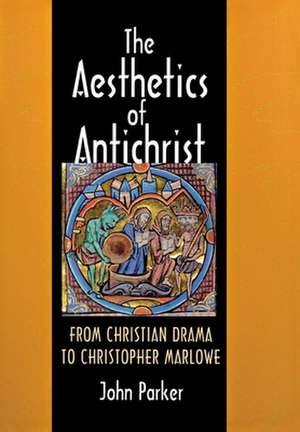The Aesthetics of Antichrist – From Christian Drama to Christopher Marlowe
Autor John Parkeren Limba Engleză Hardback – oct 2007
The Antichrist myth in particular tells of an impostor turned prophet: performing Christ's life, he reduces the godhead to a special effect yet in so doing foretells the real second coming. Medieval audiences, as well as Marlowe's, could evidently enjoy the constant confusion between true Christianity and its empty look-alikes for that very reason: mimetic degradation anticipated some final, as yet deferred revelation. Mere theater was a necessary prelude to redemption. The versions of the myth we find in Marlowe and earlier drama actually approximate, John Parker argues, a premodern theory of the redemptive effect of dramatic representation itself. Crossing the divide between medieval and Renaissance theater while drawing heavily on New Testament scholarship, Patristics, and research into the apocrypha, The Aesthetics of Antichrist proposes a wholesale rereading of pre-Shakespearean drama.
Preț: 424.50 lei
Nou
Puncte Express: 637
Preț estimativ în valută:
81.24€ • 84.50$ • 67.07£
81.24€ • 84.50$ • 67.07£
Carte tipărită la comandă
Livrare economică 14-28 aprilie
Preluare comenzi: 021 569.72.76
Specificații
ISBN-13: 9780801445194
ISBN-10: 0801445191
Pagini: 272
Dimensiuni: 152 x 229 x 25 mm
Greutate: 0.5 kg
Editura: MB – Cornell University Press
ISBN-10: 0801445191
Pagini: 272
Dimensiuni: 152 x 229 x 25 mm
Greutate: 0.5 kg
Editura: MB – Cornell University Press
Descriere
Exploring works from the Middle Ages to Marlowe, this book argues that Christian drama and ritual performance had reveled in staging the collapse of Christianity into its historical opponents (paganism, heresy), a tradition Marlowe embraced.
